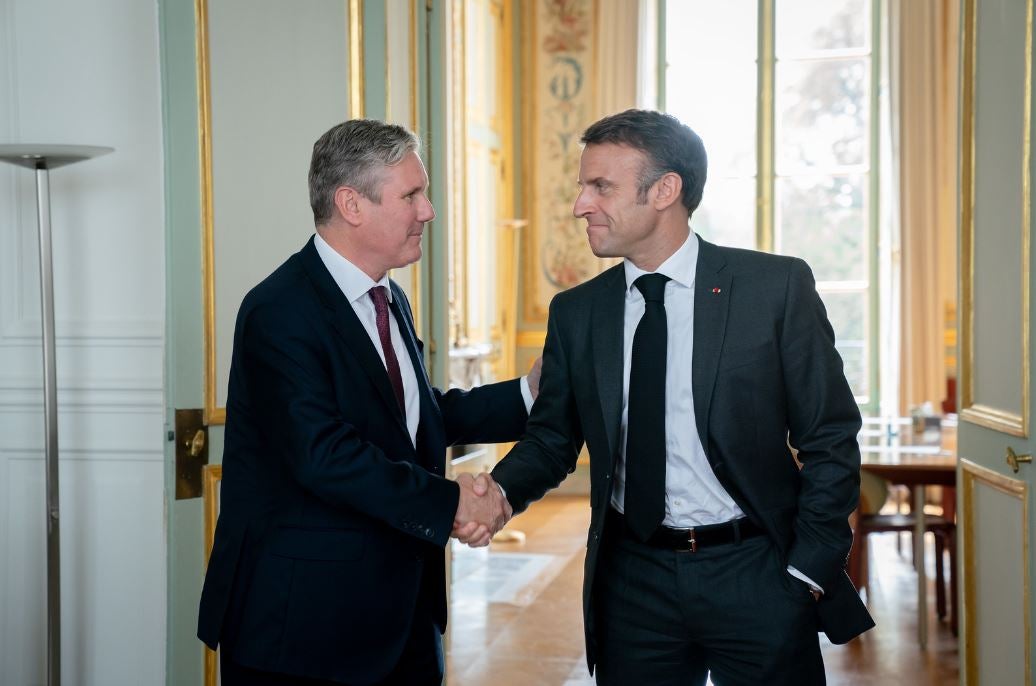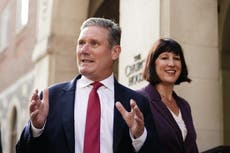Long live the Entente Cordiale: The King and Keir Starmer are right when it comes to the EU
Editorial: Politically, it is the Labour Party that is catching the current mood of the nation – a Tory Brexit is no longer the vote winner it once was

The visit of the King and Queen to Paris serves as a timely reminder to those on both sides of La Manche of the closeness of the ties that bind British and French destinies together. At a time when Brexit is yet again a very live political controversy, some sense of perspective is always welcome – and, managing to stay above politics, the King is especially well placed to do just that.
Whatever path the future relations between the UK, France and the EU take, they must remain friendly and cooperative – because Europe will remain the UK’s largest trading partner and its most immediate strategic interest. Intriguingly, the King went so far as to recall to his audience in the French Assembly (and the wider world) a particular moment in our history. Just before the fall of France in 1940, Winston Churchill proposed an “indissoluble political union” which would have “allowed our two peoples to continue the fight for justice and freedom as a single country”.
France is the UK’s longest-standing major ally, a fellow nuclear power, and we sit together on the permanent council of the United Nations. The shared interest in resisting Russian aggression in Ukraine, highlighted by the King, is only the most urgent of the security issues facing European allies. Much the same may be said of the transcendent challenges the climate crisis presents to us – something the King needed no ministerial advice to mention.
The royal visitors certainly enjoyed a warm welcome, and the House of Windsor still seems to exert a certain fascination for at least a section of the French population. It is part of the function of Britain’s hereditary head of state to be an instrument of “soft diplomacy” on behalf of the elected government of the day, and plainly this bid to thaw Franco-British relations was a success.
The King’s great-great-grandfather, Edward VII, took a famously joyful official trip to France in 1903, at a time when relations were far more acrimonious than they have been even in recent years. Long-forgotten wars and imperial disputes poisoned relations then, but geography and a growing sense of shared democratic values nudged the two powers together.
Edward VII’s visit, undertaken without ministerial accompaniment, helped pave the way for the original Entente Cordiale. It has proved an enduring relationship, despite well-known strains, and has helped shape Europe’s destiny for the good of all for more than a century. Edward VII told his hosts: “Our great desire is that we may march together in the path of civilisation and peace.” His descendant echoed those very sentiments, and won a standing ovation.
Such then is the prelude to the latest party political squalls about Brexit. Sir Keir Starmer is accused (or praised, depending on the outlook of the observer) for, according to interpretation, wanting to “betray Brexit” by not diverging from EU rules; to rejoin the EU; seeking a vaguely closer relationship; plotting Britain’s return to the EU during his lunch with President Macron; or else being snubbed by the EU, which has no intention of renegotiating the EU-UK Trade and Cooperation Agreement (TCA, ie the Brexit Treaty), anyway.
There is limited clarity on what either side wants at the moment, and into such a vacuum has rushed gusts of overheated and unrealistic speculation. Nonetheless, some common sense truths, framed by the eternal verities sketched out by the King, do seem to be looming into view.
The first is that the TCA is soon due for a scheduled technical review. This was never meant to be an opportunity to rewrite the TCA, which would require cumbersome ratification across EU parliaments and assemblies stretching into the late 2020s. However, some more modest protocols and administrative changes could be usefully added to the TCA. Such options were no doubt discussed by Sir Keir and M Macron: migrant return policies; easier checks on livestock and fresh food movements; access for professional services in the single market; and defence and security collaboration.
Such a piecemeal approach wouldn’t entail rejoining the single market or the customs union, still less the EU, and nor would it reopen Brexit and put the country through another referendum. It would in fact merely be a continuation of the Sunak administration’s approach. After all, it is Rishi Sunak, not Sir Keir, who held the first Franco-British summit since 2018 earlier this year, with an agreement on migrant patrols. Mr Sunak, a long-term committed Brexiteer, also replaced the problematic Northern Ireland protocol with the Windsor framework, and put the UK back into the EU Horizon research community.
There will undoubtedly be more of this sort of thing if Sir Keir becomes prime minister, and that is only to be applauded. “Divergence” from EU rules for the sake of it is asinine, and if a UK parliament decides to voluntarily align itself with some areas of regulation, then that is a democratic sovereign choice. Besides, the scope for post-Brexit divergence is often exaggerated. The TCA already commits the UK to keep a “level playing field”, and not to weaken or reduce levels of social, labour and environmental protection below those in place at the end of 2020 (the so-called “non-regression” clause).
Politically, it is the Labour Party that is catching the current mood of the nation, and one that can also be gently sensed in the King’s remarks in Paris, even if ministerially approved. Brexit is not the vote winner it once was and, it should never be forgotten, almost half of those voting did want to remain in the EU: 52 to 48 per cent revealed a nation obviously in two minds about its future.
Now, it is plain that Brexit has not lived up to its expectations, and the cold war waged by Boris Johnson and Liz Truss inflicted serious harm on the British national interest. Never again should someone who purports to be a British prime minister quip that “the jury’s out” on whether the president of France is a “friend or foe” of Britain.
The movement to rejoin the EU is holding marches and is sure to gather momentum the more Brexit is proven to be a flop. What the British people want right now, though, is simply to rebuild relations with Europe, and to smooth out the rough edges in the relationship, rebuilding trust, and establishing new cooperative agreements in specific areas to mutual advantage.
This could be done by Mr Sunak or Sir Keir. But the whole of Europe knows that Mr Sunak cannot do it easily or with confidence because of his squabbling, Europhobic, divided party. To deploy a much-used phrase, it is the King and Sir Keir who sound as if they are on the right side of history, and in President Macron, Britain has found a powerful friend with an eye to the future. Long live the Entente Cordiale.






Join our commenting forum
Join thought-provoking conversations, follow other Independent readers and see their replies
Comments